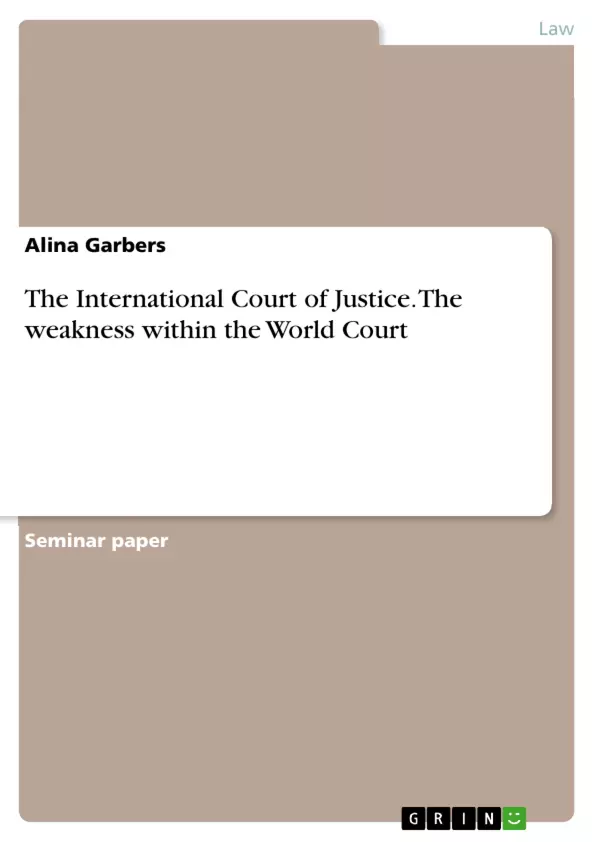While until the mid 2000’s the proliferation of international treaties, conventions and organizations that intended to guide state’s behavior could be found, scholars do currently observe a rejection of legalization and judicialization (Mondré et al 2010; Voeten 2022). This does not mean a hostile attitude towards “globalization, international organizations, and democracy” (Voeten 2022). States rather abandon bilateral investment treaties, and leave, or threaten to leave international courts (cf. ibid.). But this does not apply to all types of international treaties and Courts.
States can, e.g., decide to leave the Rome Statute within the International Criminal Court (ICC), while they cannot decide to leave the International Court of Justice (ICJ) since it is, acc. to Art. 1 ICJ-Statute, the principal judicial organ of the United Nations and shall function in accordance with its provisions of the Statute. What they can do though, is to decide to withdraw from the “optional clause”, acc. to Art. 36 para. 2 ICJ-Statute, meaning states may at any time declare that they recognize the jurisdiction as compulsory ipso facto and without special agreement or on the opposite avoiding the ICJ at all.
A form of rejection or avoidance can thereby be determined, whenever states do not use the ICJ at all or withdraw from its optional clause as the United States did in 1985 after the Court issued an unfavorable jurisdictional decision in a case relating to a U.S. military intervention in Nicaragua (cf. Anderson 2018). Scholars describe this kind of behavior as “pushback”, meaning states accept the system in general but do not use it on their own and practice criticism (Madsen et al 2018).
Inhaltsverzeichnis (Table of Contents)
- INTRODUCTION
- LEVEL OF INSTITUTIONALIZATION
- OBLIGATION
- DELEGATION
- PRECISION
- CALLING ON THE ICJ
- CONCLUSION & OUTLOOK
- REFERENCES
Zielsetzung und Themenschwerpunkte (Objectives and Key Themes)
This text analyzes the level of institutionalization of the International Court of Justice (ICJ) and explores reasons for its use and non-use by states. The author investigates the ICJ's structure and its effectiveness as a legal framework, specifically examining its level of legalization through Abbott and Snidal's framework.
- Assessing the level of institutionalization of the ICJ
- Analyzing the concept of legalization in relation to the ICJ
- Examining the role of obligation, delegation, and precision within the ICJ's structure
- Exploring factors influencing state behavior in relation to the ICJ
- Evaluating the ICJ's effectiveness and potential for further integration
Zusammenfassung der Kapitel (Chapter Summaries)
- Introduction: This chapter sets the scene by describing the growing trend of states rejecting legalization and judicialization, while recognizing the importance of further integrating the ICJ as a key institution of international law. The author introduces the concept of "pushback" and sets out the framework of the analysis, which focuses on measuring the ICJ's level of institutionalization using Abbott and Snidal's concept of legalization.
- Level of Institutionalization: This chapter delves into Abbott and Snidal's concept of legalization and its application to the ICJ. The author introduces the key components of legalization, namely obligation, delegation, and precision, and explains how they are used to categorize the ICJ's institutionalization as either "hard" or "soft."
- Obligation: This chapter examines the concept of obligation within the ICJ's framework. It analyzes the sources of law applicable to the ICJ, highlighting the complexities and challenges associated with a broad and imprecise body of law. The chapter also discusses the role of the UN Security Council as the control body for enforcing ICJ decisions and the challenges posed by the veto power held by permanent members.
- Delegation: This chapter examines the concept of delegation within the ICJ's framework. It explores the different ways states can accept the Court's jurisdiction, including the submission of optional clauses, compromise clauses in treaties, ad hoc submissions, and the invitation of legal opponents to accept jurisdiction. The author emphasizes the complexities of the principle of consent and the challenges posed by reservations and reciprocal obligations.
Schlüsselwörter (Keywords)
The core concepts and themes explored in this text include the International Court of Justice (ICJ), legalization, judicialization, institutionalization, obligation, delegation, precision, international law, state behavior, and the UN Security Council. The analysis utilizes Abbott and Snidal's concept of legalization and examines the ICJ's structure and its effectiveness in promoting legal compliance among states.
- Quote paper
- Alina Garbers (Author), 2023, The International Court of Justice. The weakness within the World Court, Munich, GRIN Verlag, https://www.hausarbeiten.de/document/1494562


